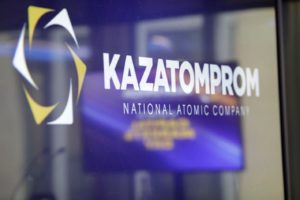
LONDON, UK: JSC National Atomic Company (Kazatomprom) announced its intention to continue flexing down production by 20% through 2022, compared to the planned levels under Subsoil Use Contracts.
The Company is also maintaining its 20% reduction against Subsoil Use Contracts in 2021, with no additional production planned to replace volumes lost in 2020, which was due to the measures taken to combat COVID-19.
Kazatomprom will now begin working with joint venture partners to assess the impact and implement the plan across all of Kazakhstan’s uranium mines.
“The decision to keep production similar year-over-year, and extend production curtailment into 2022, is indicative of a global uranium market that is still recovering from a long period of oversupply,” said Galymzhan Pirmatov, Chief Executive Officer of Kazatomprom.
“We are simply not seeing the market signals and fundamental support needed to ramp up mine development in 2021 and take our low-cost, tier one production centers back to full capacity in 2022.
“The market uncertainty attributed to the COVID-19 pandemic is significant, but despite the anticipated supply deficit in 2020, uranium prices and long-term contracting activity, while higher than in 2019, remain unsustainably low. Consequently, in line with our market-centric strategy, we intend to continue with the level of spending and operational activity commensurate with a 20% reduction to Subsoil Use Contract levels that we have maintained since 2018. We cannot rule out the possibility of further production disruptions due to COVID-19, given that the measures necessary to ensure the health and safety of our staff will continue to be our first priority.”
As was the case in previous years, the Company is announcing the plan well ahead of time to ensure its mining subsidiaries and joint ventures will be able to incorporate the required changes into their 2021 capital expenditure budgets, accounting for the revised production levels in 2022. No decision has been taken regarding mine development activity beyond 2022 and the Company continues to monitor market conditions. Kazatomprom does not expect to return to full Subsoil Use Contract production levels until a sustained market recovery is evident, and demand and supply conditions signal a need for more uranium.
The full implementation of this decision would remove up to 5,500 tU from anticipated global primary supply in 2022, with uranium production in Kazakhstan staying similar to the level expected in 2021. Kazatomprom’s 2022 production is therefore expected to be from 22,000 to 22,500 tU (100% basis), a 20% reduction of the total expected Subsoil Use Contract level of about 27,500 – 28,000 tU, as reflected in previous reports (Competent Persons’ Report, IPO Prospectus 31 October 2018). With the Company’s commitment to ESG and its market-centric strategy, Kazatomprom’s total consolidated uranium production is expected to be reduced by over 20,000 tU (100% basis) from its previous 2020 through 2022 production plans under Subsoil Use Contracts.
Kazatomprom is the world’s largest producer of uranium, with the company’s attributable production representing approximately 24% of global primary uranium production in 2019. The Group benefits from the largest reserve base in the industry and operates, through its subsidiaries, JVs and Associates, 24 deposits grouped into 13 mining assets. All of the Company’s mining operations are located in Kazakhstan and mined using ISR technology with a focus on maintaining industry-leading health, safety and environment standards.
Kazatomprom securities are listed on the London Stock Exchange and Astana International Exchange. As the national atomic company in the Republic of Kazakhstan, the Group’s primary customers are operators of nuclear generation capacity, and the principal export markets for the Group’s products are China, South and Eastern Asia, Europe and North America. The Group sells uranium and uranium products under long-term contracts, short-term contracts, as well as in the spot market, directly from its headquarters in Nur-Sultan, Kazakhstan, and through its Switzerland-based trading subsidiary, Trade House KazakAtom AG (THK).